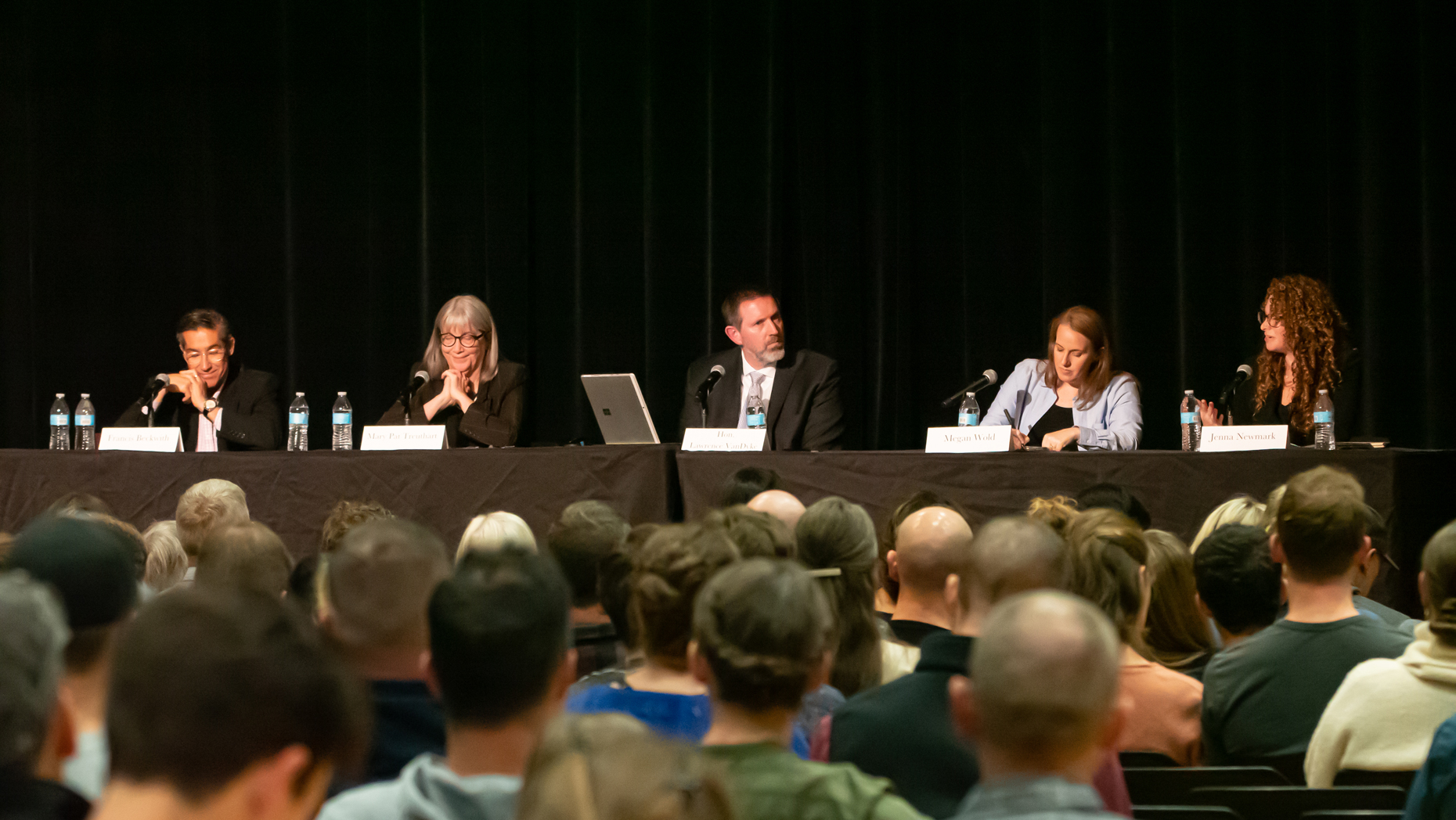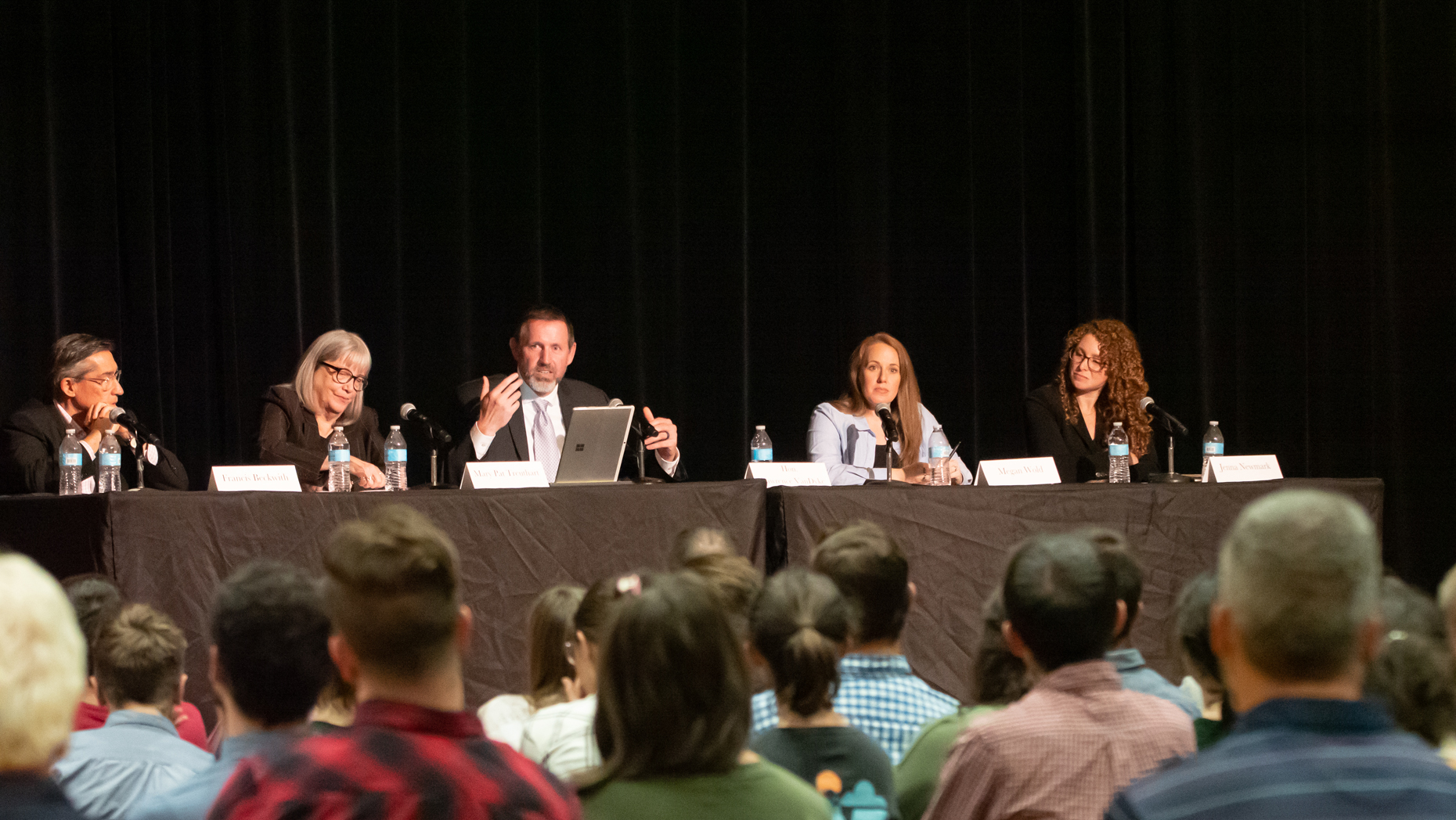
Back to blog
News
September 26, 2022
“While the on-the-street version of discourse on the Roe and Dobbs controversy has not always distinguished itself for its academic form,” Jeff Shaffer said Friday night at the Life After Roe panel discussion. “We are especially delighted to have the occasion where that sort of thing can happen: this respectful and intelligent exchange of views.”
Jeff Shaffer is the director of the Hale Institute, one of the sponsors of the panel discussion. The panel discussion focused on the recent Dobbs decision to overturn Roe v Wade.
The Hale Institute at New Saint Andrews College is dedicated to the study and discussion of law in its substance, grounding, and effects on persons and community. It carries out this mission by offering courses as well as symposia like this panel event.

Lincoln Wilson opened the event on behalf of the Federalist Society, the other sponsor for the evening. Wilson said, “There’s probably no issue other than abortion that has been more contentious in our country over the last fifty years. We are very grateful in the current political climate that these panelists have come out here to speak about this issue and have a real civil and good faith discussion about it.”
There were about 300 people in attendance at the event in the Pitman Center International Ballroom at the University of Idaho.
The panel featured four speakers: Francis Beckwith of Baylor University, Mary Treuthart of Gonzaga University, Megan Wold a former clerk to Justice Samuel A. Alito, and Jenna Newmark a Litigation Counselor for Planned Parenthood. The panel clearly presented both sides of the abortion issue. The moderator for the panel was Hon. Lawrence VanDyke, of the United States Court of Appeals for the Ninth Circuit.
The panelists were civil in their discussion while also offering counter points and clear push back to each other. The audience was also largely civil.
At one point, a man from the audience did verbally question one of Jenna Newmark’s comments. VanDyke, the moderator, however interrupted the comment, joking that he had the power to tackle anyone who tried to speak who was not on the panel.

The event opened with each panelist making a statement on the recent Dobbs decision.
Professor Treuthart, in her remarks, said, “Until we get to women having the right to vote, there was not a whole lot of focus on women in the constitution or in our history or tradition at least in the public sphere.”
She also discussed Justice Alito’s majority opinion, which she said mostly focused on the state statutes in the 19th century that criminalized abortion. Treuthart commented, “Then you start to scratch a little bit and you say, oh gee no women in the legislatures, no women could even vote, except in a couple of the territories at that time. So do we have true representation of what the people wanted through the legislative process in the 19th century? And I would say no.”
Later, Francis Beckwith took issue with Treuthart’s claim, saying, “Professor Treuthart brought up the fact that women didn’t have the right to vote in the 19th century when these laws were passed. But the 14th amendment was also passed in the 19th century and that is the ground of Roe.”
Megan Wold in her opening comments said, “\[The Roe decision] was out of step with Americans, certainly out of step with Americans at the time of Roe. At the time that Roe was decided, thirty states banned abortions.”
Jenna Newmark in her opening comments stated, “Abortion rights are inextricably linked to contraception.”
“If a woman doesn’t have the right to choose her own health care, to chart her own course in life, and to have these intimate conversations with her doctor,” Newmark explained. “Then she is essentially powerless to the state.”
Newmark also commented on the states that now have different restrictions on abortion, saying, “So we have this wild inconsistency across the states.”
Megan Wold at one point said that some will say there is a problem with gender inequality and claim that abortion is the solution to that inequality. Wold said about that claim: “And that really depends on believing that a woman’s capacity to be pregnant and to bear children somehow diminishes her, vis-a-vis a man. And I’m probably not a fair person to ask, being very pregnant myself, but I don’t believe that. I don’t believe that women are diminished by their ability to have and bear children.”
One voice in the crowd called out “Amen” which was followed by a round of clapping from the audience.
Toward the end of the panel discussion, Treuthart explained the two different methods of interpreting the constitution. She laid out the originalist position which looks at the framers’ original intent in the wording. Then she explained the living document method, which says the framers wrote these words but we are not bound by what happened in the 18th century.
Treuhart explained that the justices who dissented on the Dobbs ruling hold to the living document approach. She then commented, “The irony of the whole thing is, if you believe that the constitution is a living document, then can you at the same time want to focus on stare decisis or past precedent? So that to me is one of the ironies. So if it is living, shouldn't we be changing up some of these things that were decided or interpreted previously?”
Read more about the Hale Institute here: https://haleinstitute.org